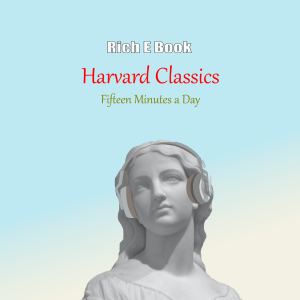
279.5K
Downloads
736
Episodes
Former President of Harvard University Charles W. Eliot wrote in his introduction to the Harvard Classics, "In my opinion, a five-foot shelf would hold books enough to give a liberal education to any one who would read them with devotion, even if he could spare but fifteen minutes a day for reading." Here you are, you can easily listen to his entire 15-minutes-a-day study guide while commuting to and from work (most of us spend far more than 15 minutes a day commuting each day), doing mundane work in the office, washing dishes at home, or doing most of the things day in and day out. It is so easy, so entertaining, and so educational that they can be listened to again and again, until they permeate into our own thinking and into our characters. Perhaps, in one year's time, you will become someone you barely recognize, all for the better. Who knows?
-- Rich E Book
Former President of Harvard University Charles W. Eliot wrote in his introduction to the Harvard Classics, "In my opinion, a five-foot shelf would hold books enough to give a liberal education to any one who would read them with devotion, even if he could spare but fifteen minutes a day for reading." Here you are, you can easily listen to his entire 15-minutes-a-day study guide while commuting to and from work (most of us spend far more than 15 minutes a day commuting each day), doing mundane work in the office, washing dishes at home, or doing most of the things day in and day out. It is so easy, so entertaining, and so educational that they can be listened to again and again, until they permeate into our own thinking and into our characters. Perhaps, in one year's time, you will become someone you barely recognize, all for the better. Who knows?
-- Rich E Book
Episodes

Monday Sep 27, 2021
Introductory Note: Blaise Pascal
Monday Sep 27, 2021
Monday Sep 27, 2021
Introductory note on Blaise Pascal (Volume 48, Harvard Classics)

Monday Sep 27, 2021
The Fundamentals of the Christian Religion, by Blaise Pascal
Monday Sep 27, 2021
Monday Sep 27, 2021
To-day we have Fundamentalists and Modernists, each striving for the same goal. Pascal, two hundred and fifty years ago, gave his precepts of the fundamentals of religious thought. (Volume 48, Harvard Classics)
Pascal confers with Descartes, Sept. 27, 1647.

Sunday Sep 26, 2021
Introductory Note: Miguel de Cervantes
Sunday Sep 26, 2021
Sunday Sep 26, 2021
Introductory note on Miguel de Cervantes (Volume 14, Harvard Classics)

Sunday Sep 26, 2021
Don Quixote (Chapter 3), by Miguel de Cervantes
Sunday Sep 26, 2021
Sunday Sep 26, 2021
The gaunt lunatic, Don Quixote, saw the world through glasses colored with romanticism that had gone out of style hundreds of years before he was born. Cervantes made the world laugh at the exaggerated stories it had been devouring. (Volume 14, Harvard Classics)
Printing of Cervantes' "Don Quixote" licensed, Sept. 26, 1604.

Saturday Sep 25, 2021
Introductory Note: John Stuart Mill
Saturday Sep 25, 2021
Saturday Sep 25, 2021
Introductory note on John Stuart Mill (Volume 25, Harvard Classics)

Saturday Sep 25, 2021
Autobiography (Ch. VI), by John Stuart Mill
Saturday Sep 25, 2021
Saturday Sep 25, 2021
John Stuart Mill in his autobiography boldly tells of his love for his friend's wife. After twenty years, she was freed from her first husband and was happily married to John Stuart Mill. Read the account of Mill's courtship. (Volume 25, Harvard Classics)

Friday Sep 24, 2021
Introductory Note: Plutarch
Friday Sep 24, 2021
Friday Sep 24, 2021
Introductory note on Plutarch (Volume 12, Harvard Classics)

Friday Sep 24, 2021
Parallel Lives of Famous Greeks and Romans (Themistocles), by Plutarch
Friday Sep 24, 2021
Friday Sep 24, 2021
When the serpent of Minerva disappeared from her temple, the priests said that the goddess had left Athens for the sea. Moreover, the oracles urged the Athenians to seek safety in their ships. Themistocles prompted these deceits. Why? (Volume 12, Harvard Classics)

Thursday Sep 23, 2021
Introductory Note: Michel de Montaigne
Thursday Sep 23, 2021
Thursday Sep 23, 2021
Introductory note on Michel de Montaigne (Volume 32, Harvard Classics)

Thursday Sep 23, 2021
That to Philosophise Is to Learne How to Die, by Michel de Montaigne
Thursday Sep 23, 2021
Thursday Sep 23, 2021
The Romans made an art of dying. The Egyptians looked on death with complacency. Moderns fear it. Montaigne argues that the purpose of philosophy is to teach men how to die. (Volume 32, Harvard Classics)
